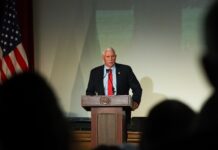Chancellor of the state system Frank Brogan discussed the recent contract negotiations and answered questions from students using Facebook Live on Tuesday.
Brogan briefly introduced himself, detailing his 38-year career in education prior to being appointed as the Chancellor of the PASSHE system.
Brogan said that he works on behalf of the board of governors to coordinate a team of people who go to the collective bargaining table. He said the collective bargaining has three components: the sheer economic package, labor language and benefits.
Brogan said that the general assembly in the last two years has increased funding to the state system. He said that the state system needs to keep advocating for further increases from the state to help with fiscal financial difficulties the state universities are facing.
Brogan also said that the faculty members are respected by both himself and the board of governors, university presidents and the broader constituents.
He said that PASSHE denied binding arbitration because the board of governors has an obligation to make decisions for the system. He says turning the decision over to a third party isn’t in the best interest of students and was denied in the past.
“We didn’t believe that was in the best interest today and in the previous round of collective bargaining,” Brogan said.
Brogan said that there are more days for negotiation scheduled and he is committed to keep negotiation going.
“We want to take those dates and any other days we can possibly acquire to go to the table, stay at the table and do what we’re supposed to do at the table, not just to avert a strike but find a successful conclusion to the collective bargaining process we’re engaged in today,” Brogan said.
Brogan said that while PASSHE does not control whether or not a strike occurs, the university is committed to having the students finish the semester and collect their respective grades and credits, even if certain delays may occur.
“Our responsibility is to make sure you collect those grades and we will do everything to make sure that obligation is fulfilled,” Brogan said.
He said that a strike is out of PASSHE’s control and that they do not want a strike to occur.
One question asked about the proposal in the negotiation process to have graduate students teach labs. Brogan said that the graduate students would have supervision from professors, but that this proposal has been withdrawn. He went on to say that the time for this to change will eventually come, with other colleges and universities in the United States using this process for years.
On the topic of whether or not students should attend classes if a strike occurs, Brogan said that students have an obligation to go to class if the faculty goes on strike and that the 14 universities in the state system have contingency plans that will keep education and food services running, along with extra and co-curricular academics.
Brogan said towards the end of the stream that the faculty members are marvelous and create wonders and makes dreams come true at their respective universities.
The live stream is available for viewing on the PASSHE Facebook page.







